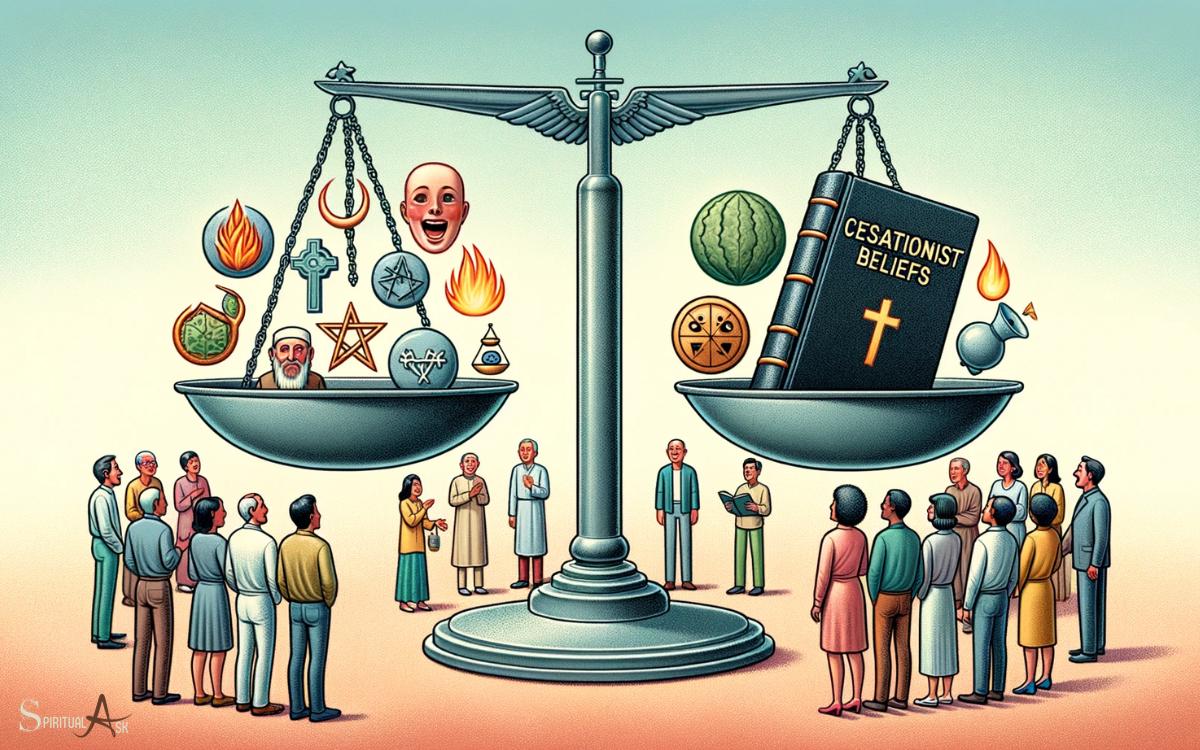Which Spiritual Gifts Do Cessationists Believe Have Ceased?
Cessationists believe that certain spiritual gifts, specifically the miraculous or revelatory gifts, have ceased to operate in the church after the apostolic age. These gifts include speaking in tongues, prophecy, and gifts of healing.
Cessationism is a theological view that certain spiritual gifts mentioned in the New Testament have ceased since the time of the early apostles.
This belief is based on the idea that these miraculous gifts were given to the apostles to authenticate their divine calling and establish the church.
Once the New Testament scriptures were completed and the apostolic age ended, cessationists argue that there was no longer a need for these supernatural manifestations.

Key Takeaway
Gifts That Cessationists Believe Have Ceased
Cessationists are christians who believe that certain spiritual gifts mentioned in the bible are no longer in operation today.

They believe that these gifts were given only to the first-century church as a sign of the apostles’ authority and to validate the gospel message.
Gifts that cessationists believe have ceased include tongues, prophecy, and healing.
Tongues
Cessationists believe that the gift of tongues, also known as glossolalia, was given by the holy spirit for the purpose of speaking in languages unknown to the speaker.

It occurred frequently in the early church but was never universal. Cessationists hold that tongues has ceased because they believe that the need for the gift no longer exists in modern times.
They argue that the gift of tongues was a temporary sign that accompanied the apostles, and there is no biblical evidence to suggest that tongues would continue throughout history.
Here are some of the reasons cessationists believe that tongues have ceased:
- Tongues were a sign to unbelieving jews (1 corinthians 14: 22), and there is no biblical evidence that tongues are still a sign to anyone today.
- Tongues were a sign of the apostles’ authority, and with the completion of the new testament canon, there is no need for apostolic confirmation (2 corinthians 12: 12).
- Tongues were a partial and temporary gift that would eventually cease (1 corinthians 13: 8).
Prophecy
Cessationists believe that the gift of prophecy was the ability to speak forth the word of god, either by foretelling or forth-telling. They maintain that the gift of prophecy has ceased because it served its purpose in the early church.

Cessationists argue that the apostles and prophets laid the foundation of the church, and with the completion of the new testament canon, there is no need for further prophetic revelation.
Here are some reasons why cessationists believe that prophecy has ceased:
- The new testament canon is complete, meaning that god’s revelation to mankind has already been given (hebrews 1: 1-2).
- Prophecy was given as a temporary gift that would eventually cease (1 corinthians 13: 8).
- The role of the prophet as a revelatory figure was fulfilled in the apostolic era (ephesians 2: 20).
Healing
Cessationists believe that the gift of physical healing was given by the holy spirit to confirm the message of the apostles.

They hold that the gift of healing has ceased because it served its purpose in the early church. Cessationists argue that god still heals today, but not through miraculous gifts like healing.
Here are some reasons why cessationists believe that healing has ceased:
- Healing was used primarily to confirm the apostles’ message (acts 14: 3).
- The gift of healing was never universal but only given to certain people (1 corinthians 12: 7-11).
- The new testament teaches that not all sickness is a result of sin, sometimes sickness is a tool used by god to bring about his purposes (john 9: 3).
Cessationists believe that certain spiritual gifts have ceased because they were temporary and served their purpose in the early church. They maintain that god still works in miraculous ways, but not through gifts like prophecy, tongues, and physical healing.
The debate about the cessation or continuation of spiritual gifts is ongoing among christians, but it is essential to recognize that all gifts are given by god for the common good and to build up the body of christ (1 corinthians 12:7-11). These gifts, often referred to as the “nine spiritual gifts explained” in 1 Corinthians 12, include wisdom, knowledge, faith, healing, miraculous powers, prophecy, discernment, tongues, and interpretation of tongues. Regardless of one’s stance on whether these gifts remain active today, their purpose has always been to glorify God and edify the church. Believers are encouraged to seek unity and love above all, ensuring that the use of these gifts reflects God’s character and advances His kingdom.
Cessationist Beliefs

Explanation Of Cessationism
Cessationism is a theological doctrine that asserts that certain spiritual gifts, such as speaking in tongues and prophesying, have ceased.
Cessationists believe that these gifts were given to the apostles in the early church to help establish it and to confirm the validity of their message.
However, once the apostles passed away, these gifts were no longer necessary or available and have therefore ceased.
Biblical Basis For Cessationism
Cessationists believe that the bible provides ample evidence of the cessation of certain spiritual gifts. In 1 corinthians 13:8-10, paul says that speaking in tongues and prophesying will cease when “the perfect comes.
” Cessationists interpret “the perfect” as the completion of the new testament canon, arguing that once the bible was complete, there was no longer a need for these gifts.
Additionally, they point to the fact that the early church fathers, such as augustine and john chrysostom, did not mention the continuation of these gifts in their writings.
Which Spiritual Gifts Cessationists Believe Have Ceased
Cessationists believe that the following spiritual gifts have ceased:
- Speaking in tongues
- Prophecy
- Healing
- Miracles
Reasons Why Cessationists Believe Certain Gifts Have Ceased
There are several reasons why cessationists believe that certain spiritual gifts have ceased.
These include:
- The completion of the new testament canon: Cessationists believe that the completion of the bible marked the end of the need for certain gifts, such as prophecy.
- The passing of the apostles: Cessationists argue that these gifts were given to the apostles to establish the early church, and once they passed away, the gifts were no longer necessary.
- Lack of biblical evidence: Cessationists point to the fact that these gifts are not mentioned in later new testament writings, such as the pastoral epistles.
- Abuse of spiritual gifts: Cessationists are critical of practices that they view as abuses of spiritual gifts, such as faith healers who use these gifts for personal gain.
Cessationism is a theological doctrine that holds that certain spiritual gifts have ceased. Cessationists base their beliefs on the biblical evidence and critical evaluation of practices viewed as the abuse of spiritual gifts.
Do Cessationists Believe in the Existence of Spiritual Nourishment or Gifts?
Cessationists, who believe that certain miraculous spiritual gifts ceased with the apostolic age, still acknowledge the existence of spiritual nourishment and gifts. Their focus is more on the enduring aspects of faith and spiritual growth rather than on supernatural manifestations.
Here’s their stance:
- Spiritual Nourishment: Emphasized through scripture, prayer, and community, seen as essential for faith development.
- Enduring Gifts: They recognize gifts like teaching, hospitality, and service, which continue to edify the church.
While cessationists might not endorse the ongoing occurrence of miraculous gifts like tongues or prophecy, they deeply value fresh bread spiritual nourishment that sustains and enriches the believer’s spiritual life.
“Cessationists may not subscribe to the continuation of all spiritual gifts, but they firmly believe in the vital role of spiritual nourishment to foster a strong, faith-filled life.”
Responses To Cessationist Beliefs

Arguments Against Cessationism
Cessationism refers to the belief that certain spiritual gifts, such as prophecy, speaking in tongues, and healing, have ceased since the time of the apostles. However, many people disagree with this viewpoint.
Here are a few arguments against cessationism:
- While the bible does mention miraculous events occurring around the time of the apostles, nowhere does it state that these events would cease altogether. In fact, the bible encourages the use of spiritual gifts in the church (1 corinthians 12: 7-11).
- Many people have personally witnessed or experienced spiritual gifts in modern times. These experiences should not be discounted simply because they do not align with a particular belief.
- The idea of cessationism can lead to the belief that god no longer interacts with humans in a miraculous way, which can be discouraging and limit one’s faith.
Biblical Evidence For Continuing Spiritual Gifts
Those who believe in continuing spiritual gifts point to many passages in the bible.
Here are a few examples:
- Mark 16: 17-18 says that believers will speak in new tongues, cast out demons, and heal the sick.
- Acts 2: 17-18 quotes the prophet joel, saying that “in the last days…i will pour out my spirit on all flesh; your sons and your daughters shall prophesy, your young men shall see visions, and your old men shall dream dreams.”
- 1 corinthians 14 discusses the importance of prophecy and speaking in tongues in the church.
Different Views Within The Christian Community
While cessationism and continuationism are often viewed as opposing viewpoints, there are many different beliefs within the christian community regarding spiritual gifts.
Here are a few examples:
- Open-but-cautious continuationism suggests that while spiritual gifts may still occur, they should be approached with caution and tested against biblical teachings.
- Third-wayers believe that spiritual gifts are continuing, but they may look different than they did in biblical times.
- Moderationism suggests that spiritual gifts occur, but they are rare and not normative for every believer.
Importance Of Unity Despite Disagreements
While there are certainly strong opinions on both sides of the cessationism debate, it is important to remember that every believer is part of the same body of christ. We should strive for unity and respect each other’s beliefs, even when we disagree.
As paul writes in 1 corinthians 12:12-13, “for just as the body is one and has many members, and all the members of the body, though many, are one body, so it is with christ for in the one spirit we were all baptized into one body.
Conclusion
Overall, cessationism is a theological view based on the belief that certain spiritual gifts such as prophecy, healing, and tongues have ceased.
Cessationists argue that these gifts served a specific purpose during the apostolic period, mainly to confirm the message of the early church, and are no longer necessary today.
The cessationist view has faced criticism from those who argue that spiritual gifts are still present and functioning in the modern-day church. While there is no definitive answer, it is important to understand and respect each other’s beliefs.
Regardless of where one falls on the cessationist-continuationist spectrum, the focus should always be on the importance of love, unity, and the gospel message.
The gifts of the spirit should never be used to divide or elevate one’s own spirituality over others, but rather to edify and build up the body of christ.






